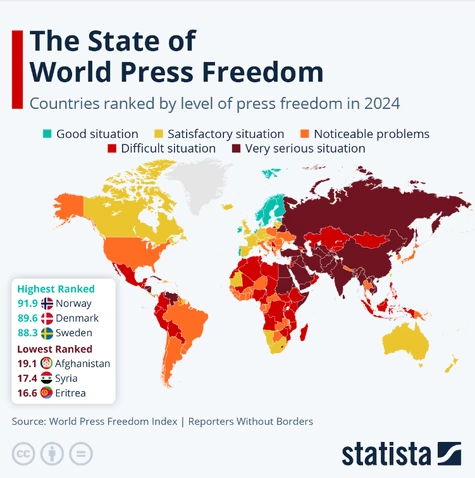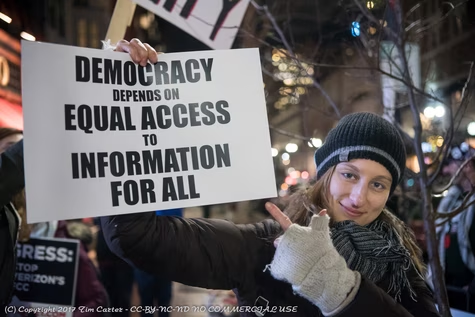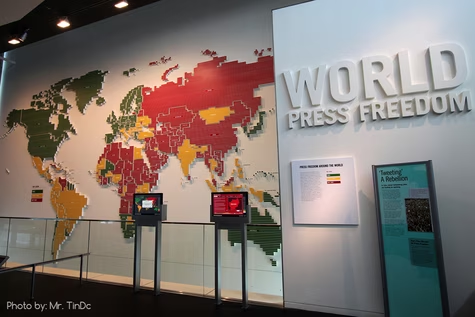
World Press Freedom Day - May 3
Explore the importance of press freedom for democracy & human rights | Censorship, threats to safety, exposing injustice, and holding the powerful accountable

➡️ Press Freedom Day, May 3 – Bringing Truth to Light in Times of Darkness
Press Freedom Day is celebrated every year on May 3rd. It was introduced by UNESCO in 1993 to emphasise the importance of press freedom to democracy and human rights. It also highlights the state of press freedom around the world and the threats and violations faced by journalists in the pursuit of truth. Freedom of the press is a fundamental right, but one that is restricted and under attack in many countries.
Please help us promote this valuable guide via Twitter, Bluesky, Facebook, and LinkedIn! - Let's spread the word and support press freedom.
Jump straight to our resources on ➡️ World Press Freedom Day
Explore our comprehensive guides on -
-
Attacks on Journalists & The Press
-
Exemplary Journalists & Whistleblowers
This year's theme is 'the impact of artificial intelligence on press freedom and the media'. AI is transforming journalism. It provides tools to assist, allows for greater efficiency, and helps journalists to fact-check. However, it can also lead to misinformation, disinformation, deepfakes, biased moderation, and increased threats of surveillance.
Journalists and publishers face arbitrary arrests, censorship, and threats to their lives. 124 journalists were killed in 2024, 82 of them were Palestinians reporting on Israel's war in Gaza - the deadliest year for journalists in a decade.
The 2024 annual report from Reporters Without Borders revealed that the situation for journalists is becoming more and more dangerous as repressive governments seek to hide the truth from public knowledge. Those reporting on wars and elections are most at risk.
Threats to press freedom are a direct attack on democracy. In 2024, 64 countries went to ballot, the equivalent of half the world's population. 2024 was one of the biggest years for elections in history. Voters simply cannot make informed decisions without a wide range of critical opinions and independent viewpoints.
The report revealed that the situation for press freedom in 31 countries is very serious, difficult in 42, and good or satisfactory in 52. This means that in 7 out of 10 countries, the climate for journalism is below acceptable standards.

Independent journalism is banned in 36 countries. Even democratic societies such as Italy, Greece, Poland, and the USA rank low on the Press Freedom Index. Countries of huge concern for the safety of journalists and the dissemination of truth include Syria, Iran, Afghanistan, Russia and North Korea.
The top 10 ranking countries are all European, with Norway, Denmark, Sweden, the Netherlands, and Finland leading the way.
One major concern is the rising threat of fake content, which distributes misinformation on a large scale, particularly on social media platforms. The unprecedented ability to tamper with content weakens journalism and undermines journalistic integrity.
The systematic involvement of politicians in massive disinformation or propaganda campaigns was also found to be widespread and is a danger to democracy in almost every country.
A terrifying precedent for journalism everywhere is the case of Julian Assange. Assange Assange spent 5 years imprisoned in the UK’s notorious Belmarsh prison for exposing the truth about U.S. war crimes to the public.
As the first publisher ever to be charged with the Espionage Act, publishers around the world are fear similar repercussions. The implications for global press freedom, human rights, and democracy are nothing short of terrifying.

Journalism in the face of the Environmental Crisis
The climate crisis is one of the planet's most pressing concerns. Visibility of the unprecedented issues we are facing is paramount to ensuring that efforts to address them are implemented.
Since the beginning of climate journalism, there have been significant challenges in obtaining and disseminating information on important issues, such as climate migration, fossil fuel industries, illegal mining, pollution, wildlife trafficking, deforestation, and biodiversity loss.
Disinformation campaigns financed by Big Oil designed to falsify scientific findings and downplay the consequences of climate change lead to a lack of public and political support for climate action. It weakens international efforts to reduce emissions, safeguard our planet's resources, protect vulnerable communities, and promote sustainability.
Journalists' role in informing the public on environmental issues is crucial. Since 2008, over 376 million climate refugees have been created as they were forcibly displaced from their homes due to floods, earthquakes, droughts, and other natural disasters. The financial cost of climate damage is estimated to be between $1.7 trillion and $3.1 trillion per year by 2050 (WEF).
These stories of loss, destruction, and injustices must be heard. Exposing the crisis is the first step to solving it, which is why we must protect and support the journalists who put their lives on the line to inform the public of what is happening across the planet.
Huge corporations and politicians try to avoid accountability as they continue to put profits over people. They try to silence the press, citizen journalists, and indigenous communities who uncover corruption, greenwashing, illegal activity, and theft.
Environmental journalism is the most dangerous field of journalism after war reporting. Between 2012 and 2022, 1,910 land and environmental defenders were killed.
The increasing success of climate litigation has amplified the voices of these defenders and encouraged more communities and environmental groups to turn to the courts. With more court's ruling on behalf of the environment, it is hoped this can be used as a tool to end impunity and ensure that companies and countries honour their environmental obligations.
"Without press freedom, we won't have any freedom. A free press is not a choice, but a necessity," - UN Secretary-General Antonio Guterres

Press Freedom for a Better World
Representing a key pillar of democracy, we must support the brave journalists who, despite significant challenges, are dedicated to informing the public with facts and inconvenient truths. As important promoters of investigative journalism, whistleblowers especially must be protected and recognised for their service to society and the strengthening of press freedom.
The public's right to transparency and information must be upheld. Better World Info advocates for freedom of speech, truth, internet freedom, and legal protections for anyone involved in disseminating accurate information.
'One of the best ways to achieve justice is to expose injustice.' - Julian Assange
For related topics, be sure to explore our guides to real news, exemplary journalists, and media literacy. German speakers should visit our partner site Bessere Welt Info for more information on Welttag der Pressefreiheit.
Author: Maximilian Stark 06.05.24, edited and translated by Rachael Mellor 09.05.24 l(Updated 15.05.25) icensed under CC BY-SA 4.0
For more information on World Press Freedom Day see below ⬇️
- World Press Freedom Day on May 3 - United Nations (official) 101317
- World Press Freedom Day on May 3rd - UNESCO 467003
- World Press Freedom Day - UNESCO (official) 101323
- World Press Freedom Day 2025 - UNESCO 467001
- World Press Freedom Day - Wikipedia 101318
- World Press Freedom Day 2025: IFJ affiliates in action 467005
- UNESCO/Guillermo Cano World Press Freedom Prize - Wikipedia 284253
- YouTube - Press Freedom Day 2025 242377
- YouTube - Press Freedom Day 242376
- #WPFD2025 466947
- #WPFD2024 410371
- #safety4journalists 343661
- #DigitalSiege 284243
- #FreePress 284241
- #NotATarget 285242
- #LetHimGoJoe 410372
- #WorldPressFreedomDay 466946
- #worldpressfreedomday 284242
- #PressFreedomDay 242374
- #PressFreedomDay - fb 242375
- #DefendPressFreedom 410374
- Windhoek Declaration - Wikipedia 284250
- CPJ on the USA 101340
- IFEX on the United States 101339
- Press Freedom Index - Wikipedia 284266
- Reporters Without Borders - Africa 101334
- RSF World Press Freedom Index - Palestine 467066
- World Press Freedom Day: Information is Critical to Peace - Vision of Humanity 285252
- World Press Freedom Day International Conference, 2025 - UNESCO 467004
- UN - 2022 Theme: Journalism under digital siege 284248
- UNESCO/Guillermo Cano World Press Freedom Prize 2022 284254
- World Press Freedom Day 2025 Signature Event: Reporting in the Brave New World – The Impact of Artificial Intelligence on Press Freedom and the Media - UNESCO 467002
- How state agents target journalists while governments claim to protect them – stark warnings from Mexico and Honduras - Conversation 02.05.25 467567
- Reporters Without Borders: Global Press Freedom at Unprecedented, Critical Low - GIJN 02.05.25 467067
- Caricartoons: a cartoon campaign for World Press Freedom Day - RSF 02.05.25 466944
- USA: Trump cuts public media, uses taxpayer funds for propaganda instead - RSF 02.05.25 466931
- CPJ, Southeast Asian lawmakers call on ASEAN to protect journalists, media freedom - CPJ 02.05.25 466939
- Serbia: Media freedom in a state of emergency - EFJ 02.05.25 466943
- World Press Freedom Day 2025: IFJ affiliates in action - IFJ 02.05.25 466942
- WPFD: IFJ event 'Stop the killing of journalists in the world’s deadliest war zones': Palestine, Syria, and Yemen 02.05.25 467006
- World Press Freedom Day 3 May: defending media freedom to safeguard democracy - European Parliament 02.05.25 466945
- Reporters Without Borders Sounds Alarm on US Press Freedom Under Trump - Truthout 02.05.25 466930
- WFPD: IFJ-NUJ-PJS Brussels events to support Palestinian journalists 02.05.25 467007
- ‘Illegal newspaper’ published on World Press Freedom Day - Norwegian Helsinki Committee 02.05.25 466941
- WPFD 2025: How can we better support Russian and Belarusian journalists in exile? - EFJ 02.05.25 466934
- CAIR Calls on U.S. Media to Defend and Amplify Gaza Journalists Targeted by Israeli Govt on World Press Freedom Day - CAIR 02.05.25 466936
- What is the state of global press freedom in 2025? - Amnesty 02.05.25 466940
- Journalism facing new threats from AI and censorship - UN Geneva 02.05.25 466932
- Reporters in Gaza bear witness and suffer tragic consequences - UN Geneva 02.05.25 466938
- On World Press Freedom Day, Journalists Face Record Killings and Rising Censorship - The Medialine 02.05.25 466937
- REM re-release debut single Radio Free Europe to aid threatened news service - The Standard 02.05.25 466935
- Trump’s Assault on PBS and NPR Chooses Oligarchy Over Press Freedom and Democracy - The Nation 02.05.25 466933
- The safety of journalists in crises and emergencies and legal drivers behind impunity - UN Office of the High Commissioner for Human Rights 12.11.24 441800
- 2024 Assistance Report: Protecting exiled journalists is crucial for press freedom 453772
- Imperialist leaders cover up illegal detention of Julian Assange on World Press Freedom Day - WSWS 05.05.24 412374
- Palestinian journalists covering Gaza war win UNESCO press freedom prize - Al Jazeera 03.05.24 410765
- 2024 World Press Freedom Index Map - RSF 03.05.24 410366
- Video: 2024 World Press Freedom Index – journalism under political pressure - RSF 03.05.24 410365
- East and Southern Africa: Journalists Targeted Amid Ongoing Crackdown on Media - Amnesty USA 03.05.24 410361
- Violent attacks against environmental journalists on the rise, report finds - Guardian 03.05.24 410370
- Palestinian journalists covering Gaza war win UNESCO press freedom prize - Al Jazeera 03.05.24 410368
- Attacks on press freedom around the world are intensifying, index reveals - Guardian 03.05.24 410369
- World Press Freedom Day: Gaza conflict deadliest for journalists - Al Jazeera 03.05.24 410367
- Governments urged to call for an end to the prosecution of Jimmy Lai on World Press Freedom Day - Hong Kong Watch 03.05.24 410359
- Palestinian journalists win top press freedom prize - Peoples Gazette 03.05.24 410358
- Biden Calls For Release Of Imprisoned Journalists, Including RFE/RL's Kurmasheva - RFERL 03.05.24 410360
- World Press Freedom Day: Gaza journalists remember slain colleagues - Middle East Monitor 03.05.24 410362
- Four major threats to press freedom in the UK - The Conversation 03.05.24 410363
- Tweet: Tomorrow is World Press Freedom Day. The world’s most consequential journalist is in prison. Speak up. And show up on May 20th! #WPFD #FreeAssangeNOW #JournalismIsNotA… 410373
- World Press Freedom Day: Statement by the High Representative on behalf of the European Union - EU 02.05.24 410364
- Journalists in exile: Report of the Special Rapporteur on the promotion and protection of the right to freedom of opinion and expression - Human Rights Council 26.04.24 449875
- World Press Freedom Day, a non-celebration - Pressenza 05.05.23 345198
- 2023 World Press Freedom Index – journalism threatened by fake content industry - RSF 03.05.23 343675
- Video: 2023 World Press Freedom Index - RSF 03.05.23 343640
- Tweet: I’m in Oslo for #WorldPressFreedomDay #WPFD invited by @PEN_Norway. We started the day laying flowers for those imprisoned and executed during the Nazi occupation for … 343655
- Future of Afghanistan’s media in the balance as world marks World Press Freedom Day - Relief Web 03.05.23 343645
- States should honor the importance of free press by ensuring journalists can do their job freely and safely - Council of Europe 03.05.23 343667
- Media freedom in dire state in record number of countries, report finds - The Guardian 03.05.23 343642
- Tweet: Journalists deserve safety, not imprisonment. Let's make the world aware of what happens when we lose #pressfreedom. Erasing one word for every imprisoned journalist. … 343662
- Blocked, censored, jailed or laid off: why it’s never been harder to be a journalist - The Guardian 03.05.23 343651
- Women journalists must be protected from violence and harassment - OHCHR 03.05.23 343673
- Bangladesh: End Crackdown Against Journalists and Critics - HRW 03.05.23 343670
- The press is in peril. Here’s how to save it - The Guardian 03.05.23 343652
- Hong Kong court considers journalist appeal on press freedom day - Reuters 03.05.23 343671
- Tweet: Today is #WorldPressFreedomDay, today we launch the #Erased. Erasing one word for every imprisoned journalist. - @freepressunltd 03.05.23 343663
- Remember the fallen and forgotten on World Press Freedom Day - The New Arab 03.05.23 343653
- Tweet: On World Press Freedom Day, we call for the immediate release of Julian Assange, who has spent 4 years in a maximum security prison. We cannot stand by and let governm… 343656
- Podcast: Press freedom in decline: can we turn the tide? - Euractiv 03.05.23 343668
- 'Independent journalism needed more than ever' - UN - RTE 03.05.23 343654
- Tweet: "Stop the threats and attacks. Stop detaining and imprisoning journalists for doing their jobs. Stop the lies and disinformation. Stop targeting truth and truth-teller… 343658
- Tweet: On World Press Freedom Day Turkey's government fails yet again to implement or support Press Freedom... - @PEN_Norway 03.05.23 343664
- World Press Freedom Day: defending press freedom is a universal mission that knows no borders, says EU - EU Neighbourseast 03.05.23 343665
- Iranian female journalists imprisoned for reporting on Mahsa Amini win top UN award - Al Arabiya 03.05.23 343666
- Tweet: This World Press Freedom Day, we are focusing on women journalists who, in addition to risks that are often the cost of independent reporting, are targeted specificall… 343657
- Media freedom in Serbia: A deepening crisis - MFRR 03.05.23 343677
- World Press Freedom Day: High Commissioner statement - OHCHR 02.05.23 343639
- Tweet: AFP staff in Turkey will strike on May 3! Due to @AFP management's refusal to consider the collapse of Turkish lira and the actual inflation rate in Turkey, we'll go o… 343659
- Secretary-General's message for World Press Freedom Day [aired on 2 May during the opening segment of the World Press Freedom Day Global Conference] - UN 02.05.23 343649
- Press Freedom Day: Secretary General urges European states to protect journalism and enhance safety of journalists - Council of Europe 02.05.23 343643
- IFLA and UNESCO Celebrate 30 Years of World Press Freedom Day with Documentary Heritage - IFLA 02.05.23 343641